
Person Maliciously Complies With A Stupid Work Policy By Coming To Work For Only 30 Minutes
Strict and micromanaging policies are not what makes people loyal and proud to be working at a company. It’s looking at the employees as the humans they are, instead of cogs in the company’s machine.
Apparently, the company in today’s story is not aware of this message. They made their employee come to work on a weekend to make up for less than an hour of missed work, and then got mad when they didn’t want to work the whole Saturday.
More info: Reddit
Sometimes you have to be bold at work to prove how nonsensical micromanaging policies are
Image credits: Kampus Production (not the actual photo)
A person got off work 30 minutes early, but soon got a request to come to work on Saturday to make up for missed time
Image credits: Holafabiola (not the actual photo)
Image credits: Matheus Bertelli (not the actual photo)
Image credits: u/oopspoopsdoops6566
The OP showed up to work on Saturday and left after exactly 30 minutes, despite the on-site boss asking them to stay for the whole day
The story that the OP decided to tell happened a few years ago. They were working for a company that had an insufferable habit of hiring underqualified employees and expecting top results. And the company used to implement many micromanaging policies.
One of these micromanaging policies was that an employee needed to work a full 40 hours a week. And if they missed any work, they had to work on Saturday to make up for it. If they didn’t make up for missed hours, they’d get a strike and 3 strikes equal firing.
One day, the OP needed to get off work 30 minutes early. They cleared it with their on-site boss. Later, they got a call from one of the owners making sure they were going to come to work on Saturday to make up for those 30 minutes. And if the OP didn’t show up, they would get a strike, as they didn’t fill their 40-hour requirement.
On Saturday, the OP got to work at 7 am. However, when the boss came to the OP to tell them what project they had to work on that day, it was already 7:25 am. And so, the OP, ready to prove their point, said that they’d be leaving in the next 5 minutes. After all, the 30 minutes that they had to make up for would be done by then.
Luckily, the OP didn’t face any serious consequences for their trick. They only got lectured over not staying overtime to help their coworkers at the start of next week. The funny thing is that a few weeks later, the policy was scrapped.
For a better understanding of the 40-hour work week, Bored Panda has reached out to employment lawyer Artūras Tukleris from the law office “Glimstedt.” He agreed to share his insight about this topic.
He said that a person’s obligation to work overtime might vary depending on the particular jurisdiction. In some countries, employers can require people to work beyond the typical 40 hours, in others they ask to do that with the employee’s consent.
Any time that exceeds agreed working hours counts as overtime. And an employee must be paid an overtime rate for it. “For example, in Lithuania, overtime must be paid at least 1.5 times of the employee’s remuneration. Also, different jurisdictions determine other requirements for overtime, e.g., maximum working time with overtime, maximum overtime, minimum rest time limits, etc., which must not be breached.”
Image credits: Andrea Piacquadio (not the actual photo)
According to Artūras, if the employee violates the standard working hours agreement, the employee “may have a right to refuse to work such overtime if such overtime does not comply with regulations.”
He added that “employees may have a right to request for additional payment for such overtime, as well as to request for payment of late interests, if the employer failed to pay such additional wage, i.e., by pursuing a lawsuit for unpaid wages or overtime, or seeking resolution through alternative dispute resolution mechanisms.”
Then, “if the employer’s actions do not comply with imperative norms of the particular jurisdiction (e.g., exceed the maximum working time or overtime requirements, minimum rest time requirements, etc.), employees may submit a complaint to a particular government agency, which may result in a fine imposed on an employer.”
The 40-hour work week requirement is not exactly a new concept. It was popularized back in 1926 by Henry Ford.
Ford said that he would pay each worker $5 per eight-hour day. That was nearly double what the average auto worker was making at the time. This type of pay and work hour distribution boosted productivity among workers.
Soon, other companies followed Ford’s lead and implemented 5 days of 8 hours of work, seeing how successful this working method was.
Well, maybe the company from the OP’s story should look up what kind of methods Henry Ford’s company used to make workers proud to be working 40 hours a week. Because, apparently, as the OP emphasized, the methods this company used didn’t provoke any kind of feelings like this for the employees.
People online cheered the OP on for such a bold move, which abolished such an absurd policy. A lot of them questioned the logic behind the people who came up with it. And some even suggested other ways that would have been better to make up for the time instead of coming in on a Saturday.
“Nice one, OP”: folks online were positively surprised by the OP’s boldness
If one of my employees needed to take 30 minutes off, they'd have that time off without any deductions. They work hard. I'm not going to quibble over 30 minutes here and there.
Yep if they work hard, then they get all sorts of perks. I schedule their wages for the day, price it into the job. If they are finished by 3pm, home time, full pay.
Load More Replies...https://www.youtube.com/shorts/V9UJcDKtp58 I LOVE the Toodeloo woman and all her charachters! Thumbs up for the reference!
Load More Replies...If one of my employees needed to take 30 minutes off, they'd have that time off without any deductions. They work hard. I'm not going to quibble over 30 minutes here and there.
Yep if they work hard, then they get all sorts of perks. I schedule their wages for the day, price it into the job. If they are finished by 3pm, home time, full pay.
Load More Replies...https://www.youtube.com/shorts/V9UJcDKtp58 I LOVE the Toodeloo woman and all her charachters! Thumbs up for the reference!
Load More Replies...
 Dark Mode
Dark Mode 

 No fees, cancel anytime
No fees, cancel anytime 







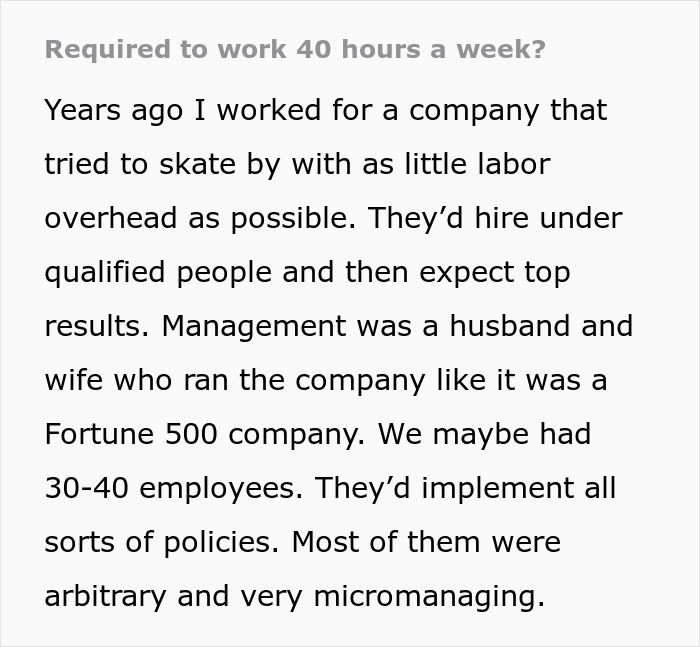
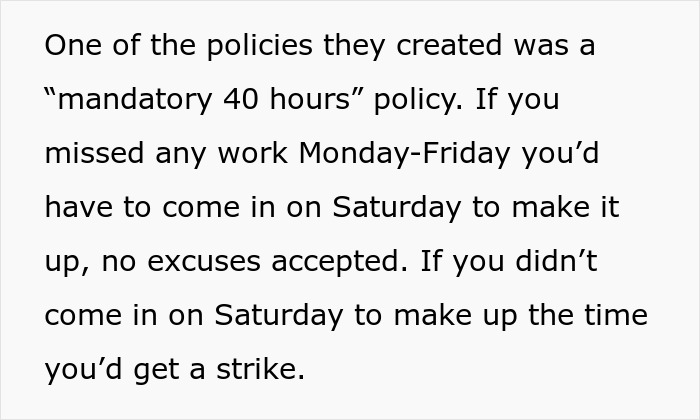
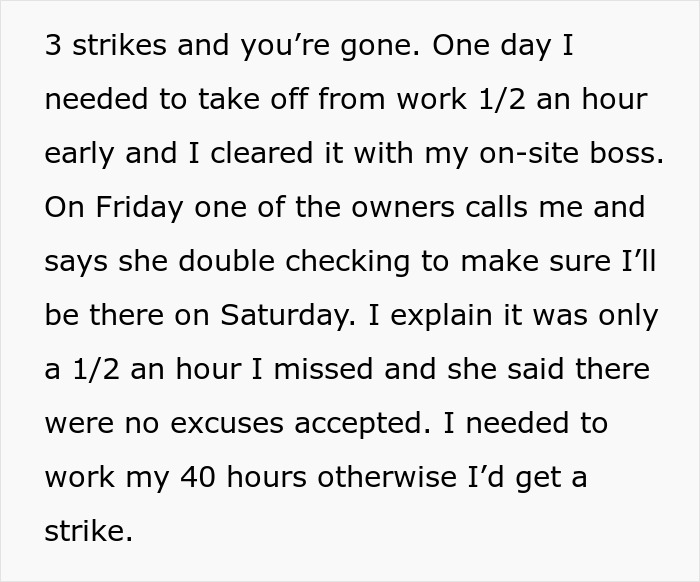

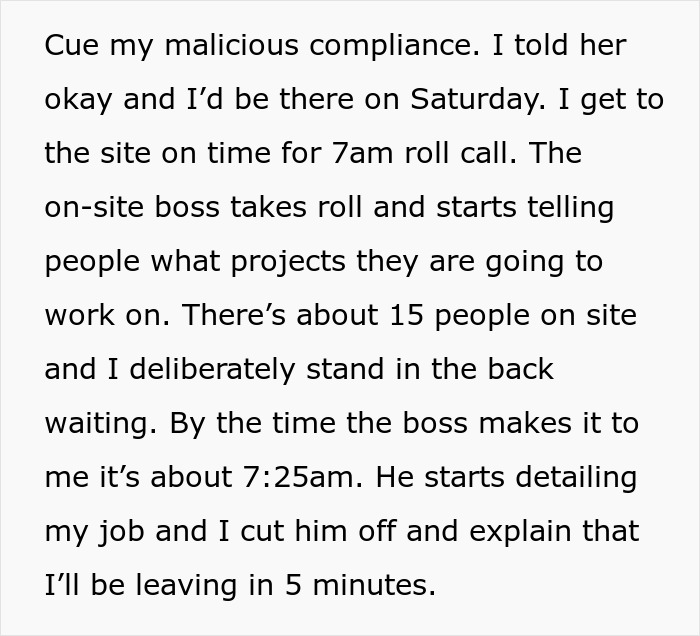
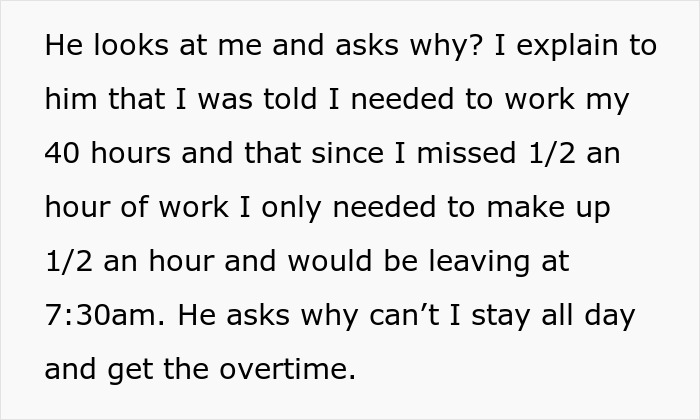

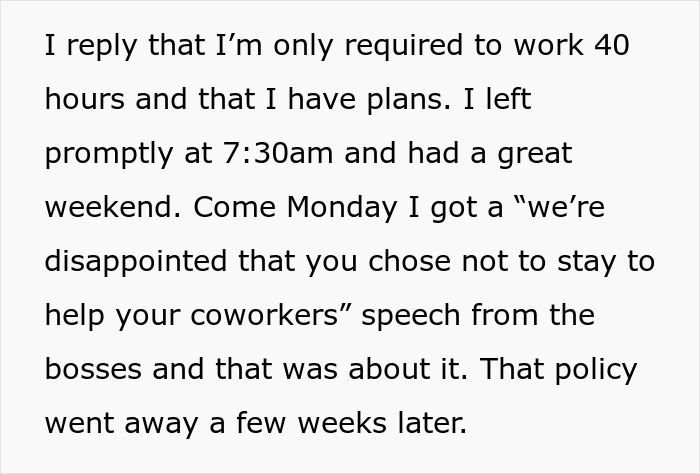



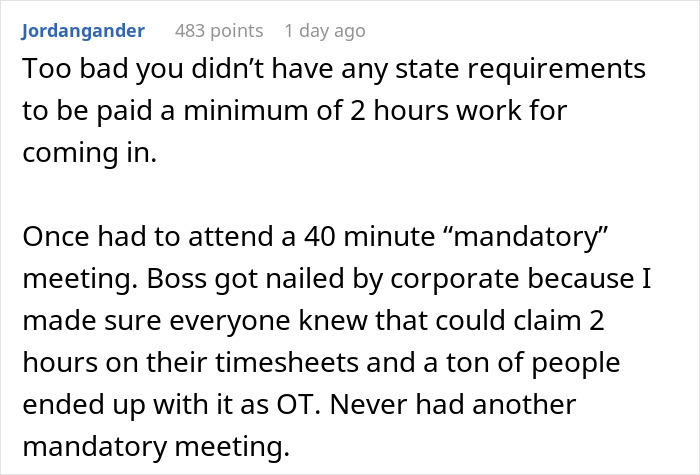
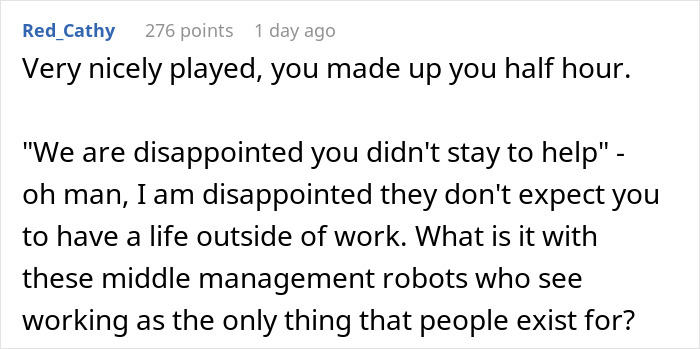






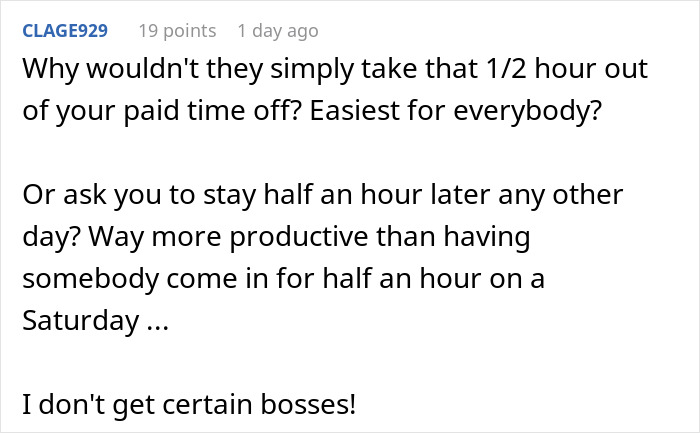













































93
17